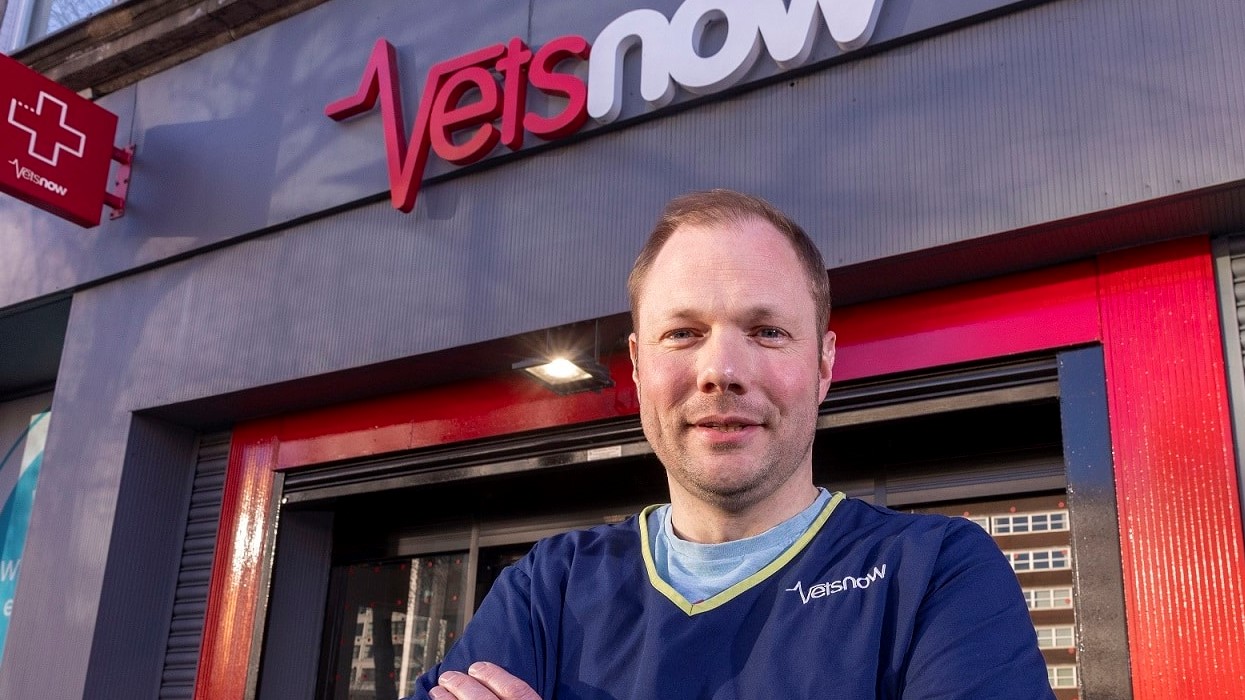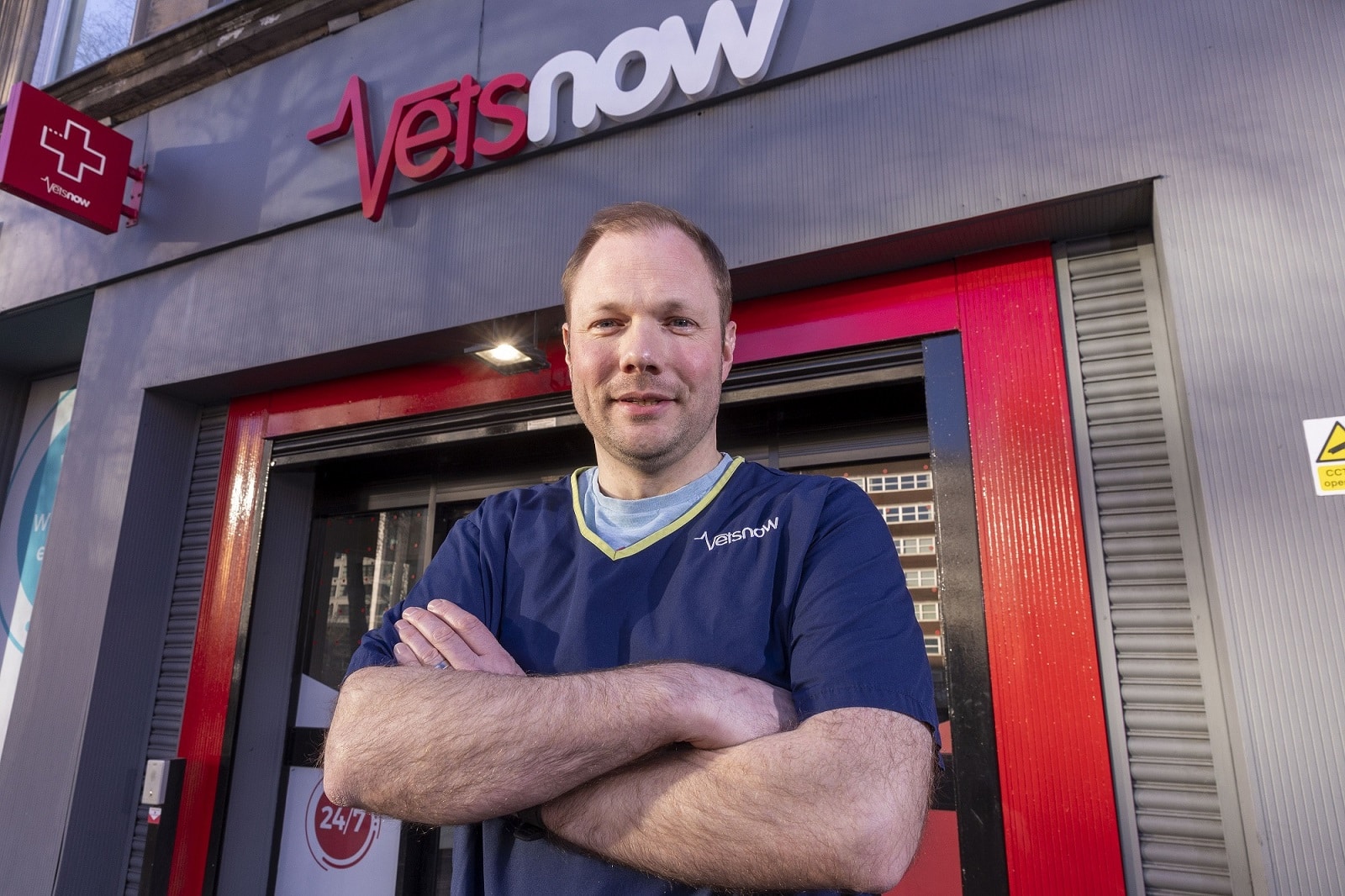Has being a vet always been your dream?
I think it was from about the age of four! We used to go on family holidays to a farm in the Lake District and I’d disappear with the farmer all day, herding sheep and seeing the other animals. I read the James Heriot books and I just loved being around animals. In school holidays I’d help at dog shelters and a horse charity and, as I got older, I did some farm work. All my studies were geared to becoming a vet and there was never any other career path.
Where did you study and what were your first steps?
I graduated from University of Glasgow Veterinary School in 2006 and initially planned to become a large animal vet because of my experiences. But I joined a mixed practice in Lockerbie and developed more of an interest in small animal work. After Laura and I got married and were thinking about starting a family, we moved back closer to family in Glasgow. We set up a Vets4Pets practice together and were there for about seven years.
What was your experience of that?
To be honest, I became more and more disillusioned. At the time my thinking was probably that I needed to get out of the industry completely. Reflecting back, I think I just badly needed a change. I didn’t really have a game plan, I just knew I needed to move away, find a fresh challenge and I saw the Vets Now Roving Vet role in November 2019.
So, how did you take to that?
I loved getting round the country and seeing how the company worked and withing weeks my passion for being a vet came back. Obviously ECC is way more exciting than day-to-day GP work, vaccinating and spaying cats and dogs, and the way we work as a team is phenomenal. You have these very sick patients come in and you all work together to make them better and I quickly felt I was achieving something and making a difference.
How did the move to Glasgow come about?
An OOH vet role in Glasgow came up within a few months and, while I loved what I was doing at Dundee and Kirkcaldy, being back in Glasgow worked better for family life. And the other big attraction was the referral hospital, having those specialists around you and seeing things you haven’t seen before. It seemed such a great opportunity to progress my career.
And has that interaction with the referral team helped you?
A huge amount. Obviously in OOH you are seeing new things all the time, but you also have time to talk over cases with the specialists and get their opinion. Naturally, there are treatments in the hospital you just wouldn’t have in general practice, so you learn a lot and grow your confidence. I have no doubt that I’m a better vet and probably a better all-round person now than I was back in 2019. The “no blame” culture within Vets Now is a big thing, and you always try to learn when things go wrong, take that forward and find a positive about how to do things differently.
When did you did you take up the Lead Vet role and what does that involve?
I started in January 2023, and I look after the OOH team and the rotating interns when they are with us. But it really is one big team, and you need everyone to come together: your receptionists, ACAs, nurses, vets. We have fabulously experienced nurses, for example, and them giving their opinion is so useful as they might spend hours with a patient and see things we don’t. Everyone’s input is welcomed and important.
And what are your thoughts and plans now you are in post?
I’m looking at ways we can make things even more efficient in the hospital and improve things for the team. I want to work on communication and ensure they always feel supported. Vets Now has a great culture of wanting people to learn and grow and I’ll be doing all I can to support that. I’ll be sitting down with the staff and making sure they don’t have any barriers in their way to becoming the best veterinary professionals they can be.
Finally, what’s the best thing about your job?
That feeling of making a difference. We had a dog transferred here which had basically died on the table at a member practice when having a Caesarean. They did a great job in resuscitating it and getting it here, but its lungs were damaged, and it arrived in a very sorry state. The time, effort, skill and expertise involved in making that patient better over three or four days was phenomenal. I was the lucky one who got to discharge that patient. The owner had obviously seen the state of the dog when it came in, and to see her face when saw her dog walk out was amazing. She was pretty much in tears, and it was all because of the part everyone here played. You build up a bond with the patient and with the owner going through what must be a terrible ordeal. When the blood, sweat and tears pay off, it’s the best thing ever.



